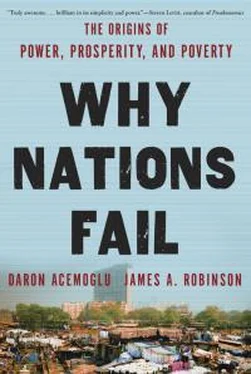Olson, Mancur C. (1984). The Rise and Decline of Nations: Economic Growth, Stagflation, and Social Rigidities . New Haven, Conn.: Yale University Press.
O’Rourke, Kevin H., and Jeffrey G. Williamson (2002). “After Columbus: Explaining the Global Trade Boom 1500–1800.” Journal of Economic History 62: 417–56.
Owen, E. Roger (1981). The Middle East in the World Economy, 1800–1914 . London: Methuen and Co.
Owen, E. Roger, and Şevket Pamuk (1999). A History of Middle East Economies in the Twentieth Century . Cambridge, Mass.: Harvard University Press.
Owen, Thomas C. (1991). The Corporation Under Russian Law, 1800–1917 . New York: Cambridge University Press.
Palmer, Robin H. (1977). Land and Racial Domination in Rhodesia . Berkeley: University of California Press.
Palmer, Robin H., and Q. Neil Parsons, eds. (1977). The Roots of Rural Poverty in Central and Southern Africa . London: Heinemann Educational.
Pamuk, Şevket (2006). “Estimating Economic Growth in the Middle East Since 1820.” Journal of Economic History 66: 809–28.
Pan, Philip P. (2008). Out Of Mao’s Shadow: The Struggle for the Soul of a New China . New York: Simon & Schuster.
Pankhurst, Richard (1961). An Introduction to the Economic History of Ethiopia, from Early Times to 1800 . London: Lalibela House.
Parsons, Q. Neil (1998). King Khama, Emperor Joe and the Great White Queen . Chicago: University of Chicago Press.
Parsons, Q. Neil, Willie Henderson, and Thomas Tlou (1995). Seretse Khama, 1921–1980 . Bloemfontein, South Africa: Macmillan.
Perkins, Dwight H., Steven Radelet, and David L. Lindauer (2006). Development Economics . 6th ed. New York: W. W. Norton and Co.
Pettigrew, William (2007). “Free to Enslave: Politics and the Escalation of Britain’s Transatlantic Slave Trade, 1688–1714.” William and Mary Quarterly , 3rd ser., LXIV: 3–37.
——(2009). “Some Underappreciated Connections Between Constitutional Change and National Economic Growth in England, 1660–1720.” Unpublished paper. Department of History, University of Kent, Canterbury.
Phillipson, David W. (1998). Ancient Ethiopia: Aksum, Its Antecedents and Successors . London: British Museum Press.
Pincus, Steven C. A. (2009). 1688: The First Modern Revolution . New Haven, Conn.: Yale University Press.
Pincus, Steven C. A., and James A. Robinson (2010). “What Really Happened During the Glorious Revolution?” Unpublished. http://scholar.harvard.edu/jrobinson.
Pintner, Walter M. (1967). Russian Economic Policy Under Nicholas I . Ithaca, N.Y.: Cornell University Press.
Post, Jerrold M. (2004). Leaders and Their Followers in a Dangerous World: The Psychology of Political Behavior . Ithaca, N.Y.: Cornell University Press.
Price, David A. (2003). Love and Hate in Jamestown: John Smith, Pocahontas, and the Heart of a New Nation . New York: Knopf.
Puga, Diego, and Daniel Trefler (2010). “International Trade and Domestic Institutions: The Medieval Response to Globalization.” Unpublished. Department of Economics, University of Toronto.
Putnam, Robert H., Robert Leonardi, and Raffaella Y. Nanetti (1994). Making Democracy Work: Civic Traditions in Modern Italy . Princeton, N.J.: Princeton University Press.
Ransom, Roger L., and Richard Sutch (2001). One Kind of Freedom: The Economic Consequences of Emancipation . 2nd ed. New York: Cambridge University Press.
Reid, Anthony (1993). Southeast Asia in the Age of Commerce, 1450–1680. Volume 2: Expansion and Crisis . New Haven, Conn.: Yale University Press.
Reinikka, Ritva, and Jacob Svensson (2004). “Local Capture: Evidence from a Central Government Transfer Program in Uganda.” Quarterly Journal of Economics , 119: 679–705.
Relea, Francesco (2007). “Carlos Slim, Liderazgo sin Competencia.” In Jorge Zepeda Patterson, ed. Los amos de México: los juegos de poder a los que sólo unos pocos son invitados . Mexico City: Planeta Mexicana.
Reno, William (1995). Corruption and State Politics in Sierra Leone . New York: Cambridge University Press.
——(2003). “Political Networks in a Failing State: The Roots and Future of Violent Conflict in Sierra Leone,” IPG 2: 44–66.
Richards, Paul (1996). Fighting for the Rainforest: War, Youth and Resources in Sierra Leone . Oxford, U.K.: James Currey.
Robbins, Lionel (1935). An Essay on the Nature and Significance of Economic Science . 2nd ed. London: Macmillan.
Robinson, Eric (1964). “Matthew Boulton and the Art of Parliamentary Lobbying.” The Historical Journal 7: 209–29.
Robinson, James A. (1998). “Theories of Bad Policy.” Journal of Policy Reform 1, 1–46.
Robinson, James A, and Q. Neil Parsons (2006). “State Formation and Governance in Botswana.” Journal of African Economies 15, AERC Supplement (2006): 100–140.
Rock, David (1992). Argentina 1516–1982: From Spanish Colonization to the Falklands War . Berkeley: University of California Press.
Romero, Mauricio (2003). Paramilitares y autodefensas, 1982–2003 . Bogotá: Editorial Planeta Colombiana.
——, ed. (2007). Para Política: La Ruta de la Expansión Paramilitar y los Acuerdos Políticos , Bogotá: Corporación Nuevo Arco Iris: Intermedio.
Sachs, Jeffery B. (2006). The End of Poverty: Economic Possibilities for Our Time . New York: Penguin.
Sahlins, Marshall (1972). Stone Age Economics . Chicago: Aldine.
Saunders, David (1992). Russia in the Age of Reaction and Reform, 1801–1881 . New York: Longman.
Savage-Smith, Emily (2003). “Islam.” In Roy Porter, ed. The Cambridge History of Science. Volume 4: Eighteenth-Century Science . New York: Cambridge University Press.
Sawers, Larry (1996). The Other Argentina: The Interior and National Development . Boulder: Westview Press.
Schapera, Isaac (1940). “The Political Organization of the Ngwato of Bechuanaland Protectorate.” In E. E. Evans-Pritchard and Meyer Fortes, eds. African Political Systems . Oxford, U.K.: Oxford University Press.
——(1952). The Ethnic Composition of the Tswana Tribes . London: London School of Economics and Political Science.
——(1970). Tribal Innovators: Tswana Chiefs and Social Change 1795–1940 . London: The Athlone Press.
Schoenhals, Michael, ed. (1996). China’s Cultural Revolution, 1966–1969 . Armonk, N.Y.: M.E. Sharpe.
Sfakianakis, John (2004). “The Whales of the Nile: Networks, Businessmen and Bureaucrats During the Era of Privatization in Egypt.” In Steven Heydemann, ed. Networks of Privilege in the Middle East . New York: Palgrave Macmillan.
Sharp, Kevin (1992). The Personal Rule of Charles I . New Haven, Conn.: Yale University Press.
Читать дальше












